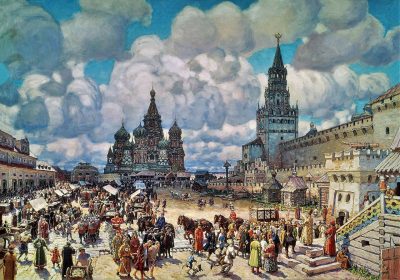
Apollinarii Vasnetsov, “Red Square in the second half of the 17th century.” Painted in 1925 – imagining an idealized past disconnected from the violence of the recent revolution and civil war.
HIST 2600A: History of Russia
Fall 2024-Winter 2025
Instructor: Prof. Erica Fraser
What does Russia mean to you?
Since Russia’s unprovoked invasion of Ukraine in early 2022 (or in 2014), it is difficult to think of Russia as anything but authoritarian and militaristic. You might think of previous political figures who seemed to forecast Vladimir Putin’s rule, like Joseph Stalin or even Ivan the Terrible, who also invaded and tried to annex neighbouring lands. Or before the current war, perhaps the concept of “Russia” made you think of art and culture, like Dostoevsky or Tchaikovsky. Perhaps your parents or grandparents grew up in Russia and talk about long lines to buy goods or about using newspapers as toilet paper in the late Soviet Union. “Russia” for you might evoke the image of Lenin giving thundering speeches to crowds of oppressed workers… Catherine the Great writing philosophical letters to Voltaire… or great architects designing the stunning onion-domed cathedrals of Orthodox Christianity.
Russia is, and has been, all of those things at various times – a brutal empire built on the labour of enslaved peasants and at the expense of non-Russian peoples; an intellectual realm where artists created some of the most famous art and literature of the modern era; a place where women enjoyed unprecedented rights at certain times in history and suffered terrible inequality at others; and a place where local democratic institutions thrived even as the monarchs remained the most oppressive in Europe.
These paradoxes help us understand the deep complexities of the history of Russia. This course is an analytical survey of what began as East Slavic history from the earliest medieval records we have to the present. We will focus on three major areas:
- Chronological: From Kievan (Kyivan) Rus’ (claimed today by Ukraine, Russia, and Belarus as each nation’s ancestral home) in the 10th century through the Mongol invasions, the rise of Moscow; the Imperial period of the Tsars; the era of the Soviet Union in the 20th century that is still so relevant today; and into the complexities of post-Soviet Russia.
- Thematic: Within this chronology, we will also examine persistent themes such as leadership and political authority; the Orthodox Church and religious minorities; women’s lives; the expansion of the empire and its impact on Ukrainians and other colonized nations; slavery (called serfdom) and emancipation; and the philosophies and ideologies that helped shape Russian history.
- Record-keeping and interpretation: How do we know what we know about Russian history? What records have survived, and how? We will look at bark carvings from early centuries, religious texts, epic poems of battles, etiquette books, law codes, royal decrees, and – in the 19th and 20th centuries – newspapers, films, and memoirs. In each era and with each of these sources, we will ask how people in the Russian and Soviet empires saw themselves in history; how they recorded their experiences and preserved (or lost) those documents; what might have been left out or who was not permitted to record their experiences for various reasons; and how we as historians should evaluate our sources – especially in today’s world, when so many Russian-produced documents are known to purposefully sow disinformation.
Online class format:
This is a 1.0 credit full-year online class that will be conducted asynchronously, which means we will not meet at any set time. The course materials will consist of my lecture videos that you can watch any time during the week, supplementary videos or podcasts, weekly readings from a textbook and some primary sources, and short quizzes designed to keep you on track. That said, I will be available once a week or more for “live” office hours or optional Q-and-A sessions via web conferencing, and I will certainly be available to help you with your essays and take-home exams.
Readings
Each week, students will read a section from a textbook as well as a collection of primary source documents (ie: voices from the period of history we are studying). This class is focused on primary source analysis and learning how one should read and analyze primary sources. Voices from the past sometimes lie to us, after all, or try to mislead us, or record the wrong event, or make the author look like a hero, or diminish the voices of women or minority groups, or remain silent on a major event that the author didn’t like… or, is it just our own contemporary goggles making these historical documents look that way to us? In short, we will learn to take a critical eye to these sources and in doing so, learn much about their authors and the societies those authors lived in – and about ourselves, as we develop our toolboxes as historians. These documents are also a great deal of fun to read and analyze, as we try to piece together “what happened” (and “why does it matter?”) from these historical fragments. These critical reading skills will help you no matter what your major or career path might be.
Assignments:
Quizzes on video content, reading responses or discussion board posts, two short essays each semester based on primary sources studied in class, and take-home exams in December and April.
Texts
One textbook will be available for purchase in either paper or e-book. There is also usually a way to rent it at a lower cost through online distributors. Primary sources will be available for free via web links.
Questions? Feel free to email me at erica.fraser@carleton.ca